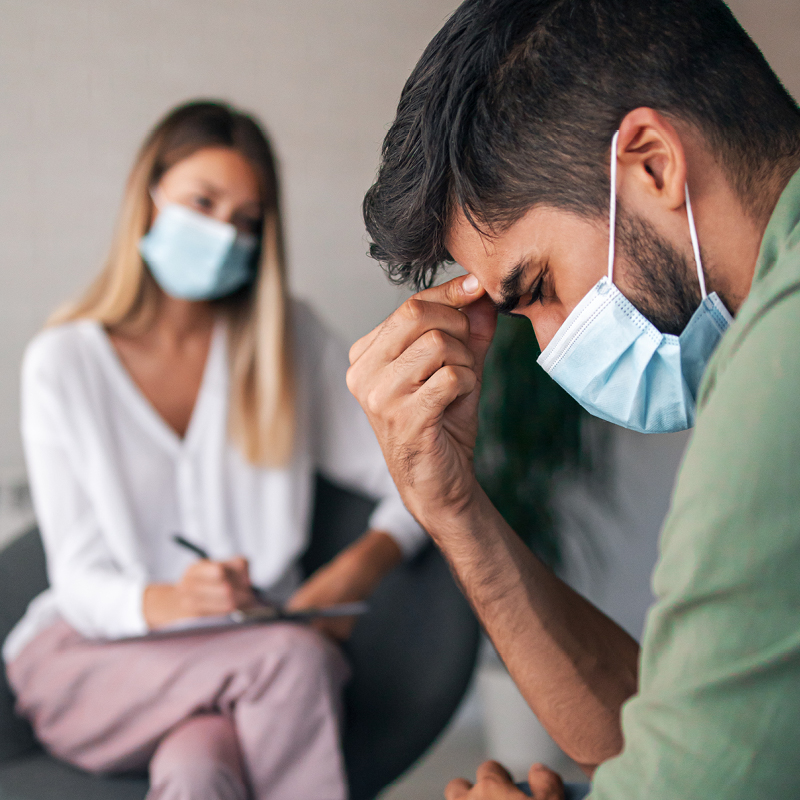Every person wakes up in the morning and has some stress in their life. Whether that stress is the result of small moments or big events, it is a daily experience for everyone.
A poll by the American Psychiatric Association found approximately 26 percent of those who responded are expecting more stress in the coming year – an increase from 21 percent last year.
Ashley Owens, LMSW, is a lead therapist with Rochester Regional Health and offers some insight into how we can identify and relieve stress – and how not to relieve stress.
Defining and recognizing stress
Stress is a response felt by your body and mind to changing events or situations that are happening every day. These changes, known as stressors, all vary in intensity and how long they last.
In most situations, stress will dissipate after an event or situation ends. However, with prolonged stress, long-term concerns or serious mental health disorders can arise – especially in situations that might not resolve.
Recognizing the point at which stress begins impacting a person’s day-to-day life usually means noticing when it impacts daily functions.
Stress can manifest physically and mentally in different ways, such as:
- Irritability or a short temper
- Feeling overwhelmed or exhausted
- Significant changes in sleep patterns
- Changing relationships or work behaviors
- Affecting how individuals care for children or family members
- Feeling overly anxious or sad
- Inability to be present in daily life
- Physical symptoms (headaches, nausea, digestive issues, body aches, chronic pain)
“Thankfully, the medical community is recognizing more often that the mind and body are connected and being healthy means taking care of both,” Owens said.
What to do when managing stress
The first step toward managing stress in a healthy way is noticing what triggers those altered behaviors. Once a person identifies those triggers, they can try to take control of it in a few different ways.
Explore it: Talk about what causes the stress with friends and/or family. They might be able to offer insight in areas that people may be unaware of. Supportive relationships also lead to a more balanced life.
Back to basics: Getting enough sleep, eating healthy meals, and regular exercise work wonders for a person’s body and mind. If we’re not doing that, it leaves us more vulnerable to the negative effects of stress.
Stick to a routine: As best as a person can, they should make an effort to find a habit or practice they can return to that reduces stress. Practicing mindfulness, meditation, or visualization can help to center a person’s emotions and lower stress levels overall.
What not to do when managing stress
The need to seek out good ways for managing stress is equally important to the need to avoid bad strategies for managing stress. These practices are unhealthy and should be avoided.
Coping with substances: Using alcohol or drugs as a quick fix or a way to “relax” can lead to problems, especially if that use becomes a pattern. Excess caffeine consumption should be avoided as well, as it is often followed by a big crash once its effects wear off.
All-out avoidance: Pushing away the thing or things that cause stress does not solve the problem. Avoiding stress triggers can build up emotions that often come out in other ways.
Severe isolation: Closing off contact with others in all forms as a way to relieve stress might actually deepen a person’s anxiety or depression
Reach out
After recognizing the triggers of a person’s stress, the next step would be reaching out to another person. That might be a friend or relative for some people; for others it could be a therapist or health care provider.
For those who want to talk with a friend and family member, that person might be in whom you can confide – or someone who simply provides a healthy distraction. These people can prove to be good stress relievers.
“These people can provide a safe space. You don’t have to tell them everything that is going on in your life, but you can surround yourself with people who help you feel better and who provide a healthy environment,” Owens said. “Feeling validated and being met where you are at can be integral to reducing your stress and boosting your mental health.”
At a professional level, there are a number of licensed therapists available through Rochester Regional Health who are ready to help anyone in need. A quick chat with a primary care provider is also a good option. If therapy is an overwhelming option, the Behavioral Health and Access Crisis Center on Genesee Street in Rochester can offer a safe place, with walk-in access, for a person to talk through their emotions or feelings.
Finding support through community groups like local chapters of the National Alliance on Mental Illness (NAMI) can be a huge help, as well. If stress is leading to more severe mental health concerns, calling the 211 Lifeline or the 988 number for the Suicide and Crisis Hotline are also available.
“Normalizing the idea of talking about stress is very important,” Owens said. “At a societal level, there is sometimes an unspoken expectation that if a person is not living with a lot of stress, they are doing something wrong. That is not the case.”









